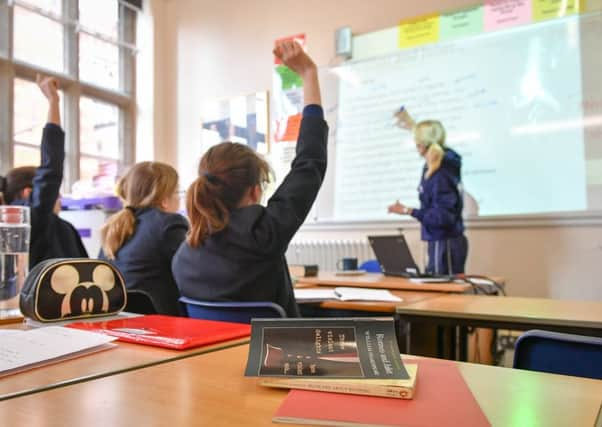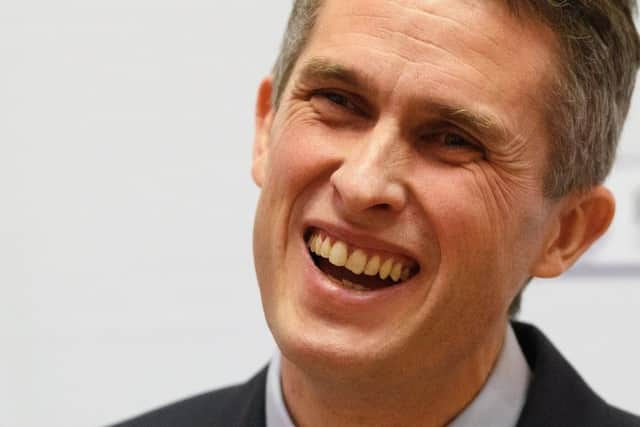Why Gavin Williamson must level the playing field for Yorkshire’s youngsters: Jayne Dowle


There’s probably no space in your head for anything other than hunting out the school uniform, amassing a full complement of pens and making sure bags are packed and projects completed.
Spare a thought for the bigger picture though. It’s not just those taking their first tottering steps into Foundation who are the new starters this year. We also have a Secretary of State for Education as freshly-minted and shiny as a pair of early September school shoes – Scarborough-born and educated Gavin Williamson.
Advertisement
Hide AdAdvertisement
Hide AdAs the son of Labour-voting parents who worked in a Job Centre and local government, no-one in Johnson’s government is better placed to understand the challenges faced by Yorkshire schools than Williamson, who graduated from the University of Bradford with a BSC in Social Sciences.


I’m hoping then that he will have our children at the top of his agenda this week. He’s right to announce that he’s going to prioritise teacher-training and encourage new recruits to take a tough stance with unruly pupils, but education is a vast brief that requires full concentration, a 360-degree view, stamina and courage in the face of opposition. Just ask Michael Gove.
My daughter, Lizzie, is about to start Year Nine at her academy secondary, her last year of ‘freedom’ as she puts it before GCSEs. My son, Jack, who’s 17, is studying broadcast journalism at our local further education college. In eight months he will be looking for work in the uber-competitive creative industries, so it’s imperative that his course prepares him for the shock of his life.
It’s not just Jack and Lizzie I’m worried about however. It’s all pupils and students in Yorkshire, who face a scandalous attainment gap with more prosperous parts of the UK that have received extra investment. And it starts early. Recent government figures suggest that 28 per cent of Yorkshire children leave reception year unable to meet expected standards in reading, writing and communication. Do any of them ever catch up?
Advertisement
Hide AdAdvertisement
Hide AdStill, I was delighted to see all the exam successes posted by proud parents on social media. I am also pleased that my town of Barnsley, certainly one of the most challenged regionally, reports a significant borough-wide improvement in the number of pupils achieving GCSE pass grades 4 to 9 in English and maths.


Scanning the headlines however, I came across a couple of disturbing news stories. Roughly a third of youngsters nationally still fail all or most of their GCSEs. What is the Government doing about this huge number of teenagers who leave school severely under-qualified? Not much, if what I’ve witnessed in anything to go by.
The much-publicised promise that every young person under 19 must remain in formal education, training or an apprenticeship sounds impressive, but it’s not happening. I know lots of youngsters, especially boys, whose GCSE omissions have never been followed up and face a future in unskilled, unstable work; it’s not good for them, and it’s not good for the Northern Powerhouse.
And also, at the other end of the scale, I’ve learned that a growing number of state sixth-form colleges are operating on a selective basis, particular in London. Although selective education until the age of 16 is highly-regulated by law, institutions can pretty much set their own rules post GCSE.
Advertisement
Hide AdAdvertisement
Hide AdI read out a paragraph from the news story to Lizzie about Camden School for Girls, a prestigious North London school notable for its superb academic reputation, “to study 4 A-Levels, students must have six or more GCSE Grade 7s or above”. She looked alarmed.
Now, I’m the last person to cry down academic excellence, but in a few years’ time, what chance has a bright girl like my daughter got at a university entrance interview against a contemporary who has had to pass such stringent tests to even get through the door to study A-Levels?
University admissions tutors are not stupid either; prestigious universities have hundreds if not thousands of applicants. What do you think they do? Take a chance on a random teenager from an obscure school or sixth-form college in the North or plump for one from a well-known institution which has basically already vetted applicants for them?
Trouble is, educational attainment in many Yorkshire towns and cities is so far behind we are way off hyper-selective sixth forms becoming any kind of norm. And parents, too, need to wise up. I still meet far too many who blithely presume that a string of 8s and 9s at GCSE guarantee their child a bright, untroubled academic future. As many Yorkshire A-Level students will tell them, the real work starts when the celebrating is over and the reality of battling for their rightful place in the world begins.